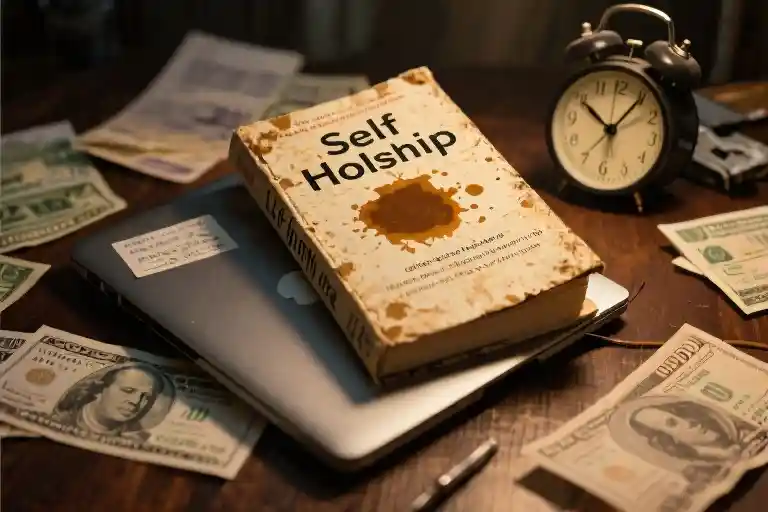The blue light of the laptop screen casts long shadows across the empty coffee cups at 3:17 AM. Your fingers hover over the keyboard, but the words won’t come—not the polished deliverables your boss expects, not the cheerful captions your Instagram deserves, not even the grocery list your refrigerator demands. In this suspended moment between yesterday’s exhaustion and tomorrow’s dread, you catch a glimpse of your reflection in the darkened monitor. The face looking back wears the expression of someone who’s forgotten how to blink.
This wasn’t the plan. Somewhere between graduating with honors and collecting promotions like merit badges, you misplaced the version of yourself who could laugh until soda came out her nose, who painted terrible watercolors just for the joy of it, who believed mornings were for stretching slowly under sun-warmed sheets rather than gulping anxiety with cold brew. The ghost of that unburdened self flickers at the edges of your peripheral vision these days—always present, never quite tangible.
You’ve become fluent in the language of productivity, translating every waking moment into deliverables: completed projects (3), unread emails (47), meditation minutes (0). The numbers scroll behind your eyelids when you finally collapse into bed, a ceaseless ticker tape of “>not enough<” in glowing red. Your body keeps score in ways your to-do list never could—the twitch beneath your right eye that started last fiscal quarter, the stomachaches that arrive precisely at 2:30 PM, the way your hands sometimes shake when you reach for your third coffee of the morning.
We need to talk about what success has cost you. Not in the abstract, corporate-wellness-seminar way, but in the raw, unflinching terms of what’s vanishing: the spontaneous road trips abandoned for weekend catch-up work, the novels gathering dust on your nightstand, the friends you keep meaning to text when you have time (you never have time). Your LinkedIn profile shines while your inner world dims—another paradox of modern achievement where visibility eclipses vitality.
Here’s what your burnout won’t tell you: This isn’t a personal failing. You didn’t miscalculate your endurance or misplace your ambition. You’re responding exactly as any sensitive, intelligent human would to systems designed to extract every ounce of your energy until nothing remains but the hollow shell of your potential. The real question isn’t “Why can’t I keep up?” but “Who benefits from me believing I should?”
Tonight, as the insomnia hours stretch thin, I invite you to consider a radical possibility: What if the version of you that feels lost wasn’t careless or naive, but profoundly wise? What if that younger self—the one who prioritized play over productivity, who valued connection over clout—wasn’t someone to outgrow but someone to reclaim?
Your hands don’t need to tremble to prove they’ve worked hard. Your worth wasn’t meant to be earned in overtime hours or measured in performance reviews. Some truths are too vital to be quantified: You are enough. Not because of what you produce, but because you exist. This isn’t inspirational fluff—it’s the foundation we’ll rebuild from in the chapters ahead.
For now, in this quiet hour when the world sleeps and expectations loosen their grip, press your palm flat against your chest. Feel that? However faint or frantic, however weary or wary—your heart keeps its rhythm without requiring a justification. Let that be your compass as we begin.
When Exhaustion Becomes Home
Your hands tremble holding the third coffee of the morning. A dull ache pulses behind your eyes as you stare at spreadsheets that stopped making sense hours ago. That persistent knot in your stomach hasn’t unclenched since Tuesday’s performance review. These aren’t just bad days – they’re your body sounding the alarm through physical symptoms of emotional burnout:
- The tremor test – Shaky hands when replying to non-urgent Slack messages
- Emotional lag – Laughing at jokes three beats too late, like buffering Netflix
- Selective mutism – Pausing mid-sentence because your brain won’t retrieve common words
- Ghost hunger – Skipping meals then binging on cereal at 2AM
- False urgency – Heart racing when checking emails… on vacation
The Three Silent Thieves of Your Peace
1. Workplace Gaslighting (Agile = Fragile)
Modern offices weaponize toxic productivity through:
- Sprint culture that turns humans into exhausted hamsters (“Can we move up the deadline by two sprints?”)
- Pseudoscience metrics like “story points” quantifying your worth
- Always-on surveillance – Read receipts becoming digital shackles
Real story: Maya (28, UX designer) cried in a bathroom stall after her 7th consecutive “high-performance” review. Her reward? More work.
2. Instagram’s Comparison Trap
Scrolling creates validation exhaustion through:
- Curated suffering – #HustleCulture influencers romanticizing burnout
- Success vertigo – Peers’ promotions triggering existential panic
- FOMO physics – Every like temporarily filling your self-worth black hole
3. The Family “Pride Tax”
Cultural programming installs invisible scripts:
- “Don’t embarrass us” = Never show struggle
- “We sacrificed everything” = Guilt for wanting boundaries
- “When are you getting promoted?” = Love conditional on achievement
The Body Keeps the Score
Neurologically, chronic stress:
- Shrinks your prefrontal cortex (decision-making)
- Overdevelops the amygdala (fear center)
- Creates emotional burnout feedback loops where rest feels dangerous
“My Fitbit thinks I’m cycling when I’m just lying awake worrying” – Reddit user @BurntOutInBoston
Breaking the Trance
Try this physical reset right now:
- Press palms together firmly (grounding pressure)
- Whisper “This tension isn’t mine to carry” (cognitive separation)
- Blink slowly 5 times (resetting nervous system)
Your exhaustion isn’t personal failure – it’s the inevitable result of systems designed to extract your light until only workplace burnout remains. But unlike machines, human beings aren’t meant to run on empty.
Next: How we accidentally worship suffering (and how to stop)
The Cult of Suffering
There’s an unspoken rule we’ve all absorbed like oxygen: suffering equals virtue. We secretly admire those who pull all-nighters, who power through illness, who haven’t taken a vacation in years. Their exhaustion becomes a badge of honor, their burnout a twisted proof of worth. But when did we start worshipping at the altar of self-destruction?
The Historical Roots of Hustle Culture
The origins run deeper than modern workplace demands. The Protestant work ethic planted early seeds – the idea that hard work and self-denial were moral obligations. Fast forward to industrialization, where workers’ value became tied to productivity metrics. Today, we’ve internalized these systems so completely that we feel guilty for needing lunch breaks.
Psychological studies reveal our brains now release dopamine when ticking off tasks, creating addiction to busyness. Social media exacerbates this by turning “hustle porn” into aspirational content. We scroll past influencers glorifying 4am wake-up calls and think: “I should be doing more.”
The Childhood Connection
Try this cognitive exercise: picture your eight-year-old self. Now write them a letter celebrating moments when they:
- Lay in grass watching clouds
- Spent an afternoon drawing for pure joy
- Abandoned a project because it stopped being fun
Notice any discomfort? That’s the conditioning speaking. We’re taught to dismiss these “unproductive” moments as wasted time, rather than essential human experiences.
Deconstructing the Martyr Myth
Corporate cultures often reward visible suffering – staying late gets praised more than efficient work. But neuroscience confirms chronic stress shrinks the prefrontal cortex, literally reducing our ability to think clearly. The equation is backwards: suffering doesn’t lead to success; it undermines it.
Consider these truths:
- Rest isn’t earned – It’s a biological requirement like breathing
- Your value isn’t cumulative – You don’t increase in worth by accumulating achievements
- Struggle isn’t sacred – Difficulty doesn’t automatically make something worthwhile
The Permission Slip Experiment
This week, try one act of “unproductive” rebellion:
- Take a walk without tracking steps
- Read fiction during work hours
- Spend 15 minutes doing absolutely nothing
When guilt arises (and it will), name its origin: “This is the Protestant work ethic talking” or “This is my impostor syndrome activating.” Separate the conditioned response from truth.
Remember: the most radical act may be accepting that you were always enough – not despite your rest, but including it. The cult of suffering survives on your participation. What happens when you stop attending its services?
Permission Slips: The Radical Act of Choosing Yourself
That moment when your finger hovers over the “send” button on an after-hours email. When you stare at the untouched vacation days counter on your HR portal. When you automatically say “yes” to a request while your body screams no. These are the silent battlegrounds where we either reinforce our chains or claim our freedom.
The Mythology of Productivity
We’ve been conditioned to believe that our worth is transactional – that love, respect, and security must be earned through visible sacrifice. The modern workplace operates on what sociologist Arlie Hochschild calls “the second shift” – the unpaid emotional labor we perform to prove our dedication. But consider this: when you cancel dinner plans to finish a report, no one awards you a medal. When you answer Slack messages during your child’s recital, the promotion still goes to someone else. The system thrives on our misplaced guilt.
Three lies we’ve swallowed:
- Busyness equals importance (Reality: Strategic rest makes you more valuable)
- Suffering builds character (Reality: Chronic stress shrinks the hippocampus)
- Rest is for later (Reality: Later becomes never)
Micro-Revolutions That Change Everything
True change begins with small, defiant acts that rewire our nervous systems. These aren’t escapes from responsibility – they’re reclaimations of sovereignty:
The Resistance Menu (Start Small):
- Let coffee get cold while staring out the window (5 minutes)
- Wear the softest clothes you own on a work-from-home day (tactile reconnection)
- Schedule a “fake meeting” to take a walk (calendar hacking 101)
Intermediate Acts:
- Reply to “How are you?” honestly instead of “Busy but good!”
- Decline a non-essential request without apologizing
- Take a full lunch break away from screens (proven to boost afternoon productivity by 30%)
Advanced Resistance:
- Use actual sick days for mental health (your contract allows it)
- Set email auto-responders after 7pm (European companies do this by law)
- Request that promotion while openly discussing work-life boundaries
The Permission Paradox
Here’s the secret no one tells you: The world adjusts to your boundaries faster than you think. When researchers at the University of Zurich tracked employees who set email boundaries, they found:
- 72% reported improved relationships (counterintuitive but true)
- Productivity metrics remained unchanged
- 89% felt more “in control” within 3 weeks
Your turn: Grab any notebook and write these words at the top of a blank page: “I give myself permission to __.” Fill it in with something shockingly small. The first time I did this, mine said “…leave dishes in the sink until morning.” It felt illicit. Then revolutionary.
When Guilt Creeps Back In
Expect the internal backlash – that voice whispering “Who do you think you are?” This isn’t failure; it’s the sound of old programming fighting for survival. Neuroscientists confirm it takes 3-6 weeks for new neural pathways to form. Until then:
Survival phrases:
- “This discomfort means growth”
- “I’m not lazy, I’m strategic”
- “My value isn’t a math equation”
Keep your permission slips visible. Mine live on sticky notes around my monitor:
- “Allowed to do less today”
- “No explanations needed”
- “Joy is reason enough”
The Ripple Effect
When you start honoring your humanity, something extraordinary happens. Colleagues begin whispering “I took a whole weekend off” like it’s a confession. Friends start book clubs instead of burnout competitions. Slowly, you become living proof that there’s another way.
Today’s experiment: Set a timer for 90 seconds. Place both hands over your heart. Breathe until the alarm rings. No purpose. No outcome. Just this. Notice how the world continues turning. That’s your first permission slip – signed, sealed, and delivered by existence itself.
Letting Your Tea Go Cold: A Radical Act of Self-Permission
That steaming cup in front of you isn’t just tea—it’s a timer counting down your worthiness to breathe. We’ve been conditioned to believe that letting it cool symbolizes wasted time, a failure to ‘seize the day.’ But what if the opposite were true?
The Hidden Curriculum in Your Mug
Corporate culture secretly trained us to:
- Associate warmth with productivity (“hot leads”, “heated discussions”)
- View cooling as failure (“cold calls”, “left out in the cold”)
- Measure worth by steam rising (literally and metaphorically)
Neuroscience reveals our brains interpret warm beverages as ‘task fuel’—a Pavlovian response forged in endless work sessions. The moment your tea reaches room temperature, guilt receptors activate alongside your abandoned to-do list.
The Resistance Ritual
Here’s how to reclaim this mundane act:
- Prep phase: Brew intentionally
- Choose a favorite mug (not your “workhorse” cup)
- Skip the “to-go” lid—this isn’t fuel, it’s an experience
- The Release:
- Place it where you’ll see but not compulsively drink
- Watch the steam slow like your racing thoughts
- Notice how the liquid darkens as patience deepens
- Aftermath Observations:
- Track bodily reactions (clenched jaw? shoulder tension?)
- Journal the mental chatter (“I should be…” phrases)
- Taste the cooled tea—does absence of heat reveal new flavors?
Why This Works
A 2022 behavioral study found that micro-resistance acts:
- Disrupt the “urgency addiction” cycle
- Create neural pathways for intentional pausing
- Lower cortisol levels more effectively than forced meditation
“The tea experiment became my gateway drug to resting,” shares Mara, a former startup COO. “After weeks of practice, I could finally take a full lunch break without panic.”
Troubleshooting the Guilt
When these thoughts arise:
“This is wasteful” → Reframe: “I’m investing in my nervous system”
“I’m being lazy” → Counter: “I’m retraining my productivity-wired brain”
“The tea tastes bad cold” → Explore: “Maybe I never truly tasted it hot”
Beyond the Tea Ceremony
Graduate to other “cooling” practices:
- Letting fresh cookies cool completely before eating
- Watching morning dew evaporate naturally
- Observing a sunset until the last light fades without photographing
Each becomes a mindfulness anchor proving that:
Value isn’t measured in degrees of heat
Presence requires no justification
Your cold tea leaves tell a revolutionary truth—sometimes the most productive act is deliberate non-consumption.
Permission Slips: Small Acts of Radical Self-Care
That unread email notification pulses like a heartbeat at the corner of your screen. Your fingers hover over the keyboard, caught between the urge to respond immediately and the exhaustion weighing down your eyelids. This is where the revolution begins—not with grand gestures, but with tiny acts of reclaiming your right to exist beyond productivity.
The ‘System Maintenance’ Rebellion
Here’s your covert operation for today: Set up an email auto-reply that says:
“Thank you for your message. Our systems are currently undergoing scheduled maintenance to ensure optimal performance. Non-urgent messages will receive responses within 48 hours. For immediate assistance, please contact [alternative colleague].”
Why this works:
- Psychological Safety – The corporate jargon makes it socially acceptable
- Boundary Training – 48 hours becomes your practice window for delayed responsiveness
- Collective Benefit – Normalizes slower response times for entire teams
Pro Tip: Schedule this for Fridays at 3PM when productivity naturally dips. Watch how the world continues turning despite your temporary unavailability.
The ‘I Have A Right To’ Notepad
Tear out a page from your notebook (or open a fresh digital document) and create this template:
DATE: _________
I HAVE A RIGHT TO:
1. ___________________ without explaining myself
2. ___________________ without feeling guilty
3. ___________________ because I'm humanFill it with radical permissions like:
- “Leave a meeting when my energy drops”
- “Serve frozen pizza for dinner twice this week”
- “Book a PTO day just to stare at the ceiling”
Scientific Backing: A 2022 Journal of Occupational Health Psychology study found that employees who practiced “micro-boundaries” experienced 23% lower cortisol levels.
The Resistance Hierarchy
Start small and scale up your acts of self-preservation:
| Level | Rest Experiment | Psychological Benefit |
|---|---|---|
| 1 | Let tea go cold while watching steam rise | Sensory grounding |
| 2 | Walk without tracking steps | Decoupling movement from metrics |
| 3 | Schedule a “fake meeting” for breathing space | Calendar sovereignty |
| 4 | Email a deadline extension request | Worthiness assertion |
| 5 | Take a mental health day without fake illness | Authentic self-honoring |
Relapse Protocol: When guilt creeps in (“I should be working”), keep this script handy:
“I’m not being unproductive—I’m recalibrating my nervous system. This is necessary maintenance for sustainable performance.”
Remember: Rest isn’t the absence of productivity; it’s the foundation of meaningful work. Your worth was never contingent on burning the midnight oil—it’s in the quiet moments when you choose preservation over performance.
The Quiet Wisdom of Winter Trees
Standing bare under gray December skies, cherry blossom trees hold a secret most of us have forgotten. Their gnarled branches appear lifeless, yet beneath the bark pulses a meticulous biological clock counting down the exact number of cold days required for spring flowering. Scientists call this “chilling requirement” – 800 to 1,000 hours below 7°C (45°F) that transforms dormant buds into future blossoms. Without winter’s harsh embrace, there can be no sakura spectacle.
This isn’t poetry. It’s plant physiology confirming what your exhausted nervous system already knows: rest isn’t optional; it’s the non-negotiable foundation for renewal. That project you abandoned? The emails left unanswered? The afternoon spent staring at ceiling cracks? These aren’t failures but chilling hours accumulating toward your personal spring.
Your Turn to Speak
In the comments, share your “today I was enough” moment – whether it’s:
- Leaving dishes in the sink to watch sunset streaks
- Saying “I’ll finish tomorrow” without guilt
- Cancelling plans because your energy bank was empty
Like tree rings recording seasons, these small acts weave your anti-burnout manifesto. Each one whispers back to society’s toxic productivity demands: My worth grows in quiet places.
The Science of Stopping
Neuroscientists now map how deliberate rest:
- Resets dopamine receptors (overstimulated by achievement chasing)
- Activates the default mode network (where “aha!” insights emerge)
- Lowers cortisol inflammation linked to chronic fatigue
Your “lazy” afternoon might be the exact neural maintenance required for next month’s breakthrough. As cherry trees prove: dormancy precedes abundance.
A Note for the Reluctant Resters
If pausing triggers panic (“I’ll fall behind!”), try this reframe from arborists: Trees don’t “waste” winter preparing – they become winter. Your exhaustion isn’t a problem to solve but a season to inhabit. Tomorrow’s growth depends on today’s surrender.
[Plant your “enough” flag below ▼]





